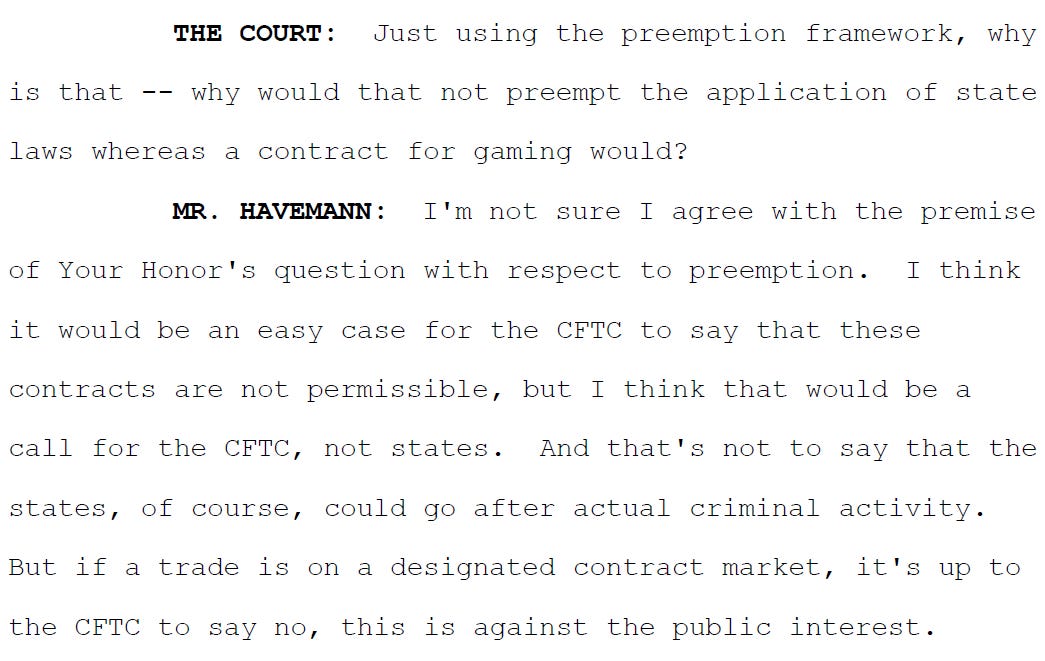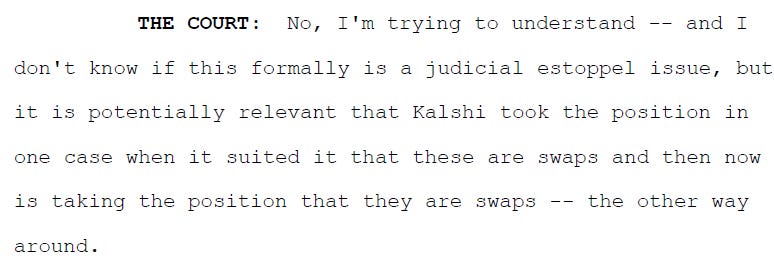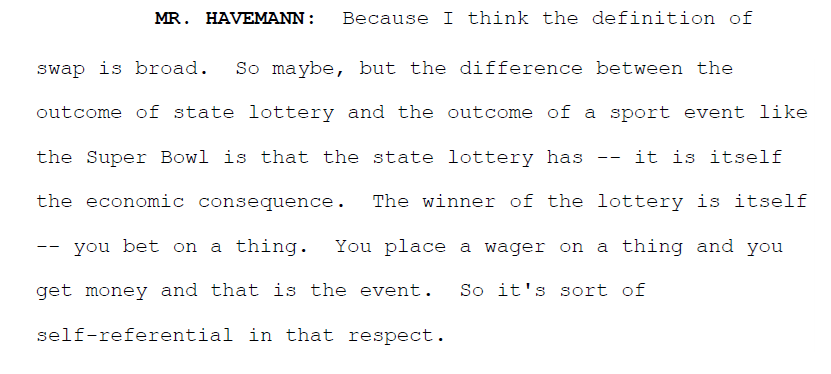Kalshi’s Maryland Fight: Third Time’s (Not) The Charm?
Attorneys for the prediction market platform run into tougher questions from the judge in oral arguments in Maryland federal court
Last week, Kalshi’s lawyers squared off against Maryland’s gaming regulators in Maryland federal court. Kalshi asked the presiding judge, Judge Adam Abelson, to follow the lead of federal judges in Nevada and New Jersey by temporarily blocking Maryland’s enforcement efforts against the company.
Seriously, “Nevada” and “New Jersey” were in the first sentence of Kalshi’s opening.
Unlike the federal judges in Nevada and New Jersey, however, Judge Abelson seems … skeptical. For one, he kept describing Kalshi’s contracts as “bets.”
…
…
We won’t know how Judge Abelson really feels about Kalshi’s legal arguments until at least the end of the month – both sides have more lawyering to do.
It’s safe to say, however, that Judge Abelson’s giving Kalshi the most pushback that we’ve seen so far. I’m not saying Kalshi’s going to lose in Maryland. But Judge Abelson seems to recognize that his ruling here might be the entire ballgame (in Maryland, anyway), and he wants to make sure that his decision doesn’t fall apart like the Orioles. (Too soon?)
Here are five key observations from this latest chapter of Kalshi vs. the states.
1. Kalshi tries to duck some hard questions
One thing that judges like to do is to ask hypotheticals to test the boundaries of legal arguments. And boy, Judge Abelson asked some tough hypotheticals.
First, Judge Abelson asked whether state law enforcement officials couldn’t go after contracts involving assassination.
Here’s Kalshi’s response.
Judge Abelson then nudges Kalshi’s lawyer to actually answer the question.
Translation:
Later, Judge Abelson asks whether Kalshi could offer lottery-based contracts. Again, Kalshi’s initial reaction is to swerve:
Judge Abelson doesn’t let Kalshi off the hook; Kalshi’s answer is basically, “maybe, maybe not.” (More on that below.)
2. Judicial estoppel ain’t it
When Kalshi was defending the legality of its election contracts, it drew contrasts to “gaming contracts,” essentially saying, “Look, these election contracts are legit, they’re not like gaming contracts, which generally have no inherent economic value.” There’s definitely some tension between those statements and what Kalshi’s saying now about its sports event contracts. And there’s an open question as to the significance of Kalshi’s prior statements in its current court battles.
Maryland is no exception. Kalshi’s prior statements are clearly not sitting well with Judge Abelson.
Some have argued that, because of this tension, Kalshi’s judicially estopped from challenging state gaming enforcement on preemption grounds. In a nutshell, judicial estoppel is the idea that you can’t take two contradictory positions in different legal proceedings to try to win both.
It’s not clear to me that Maryland’s actually arguing for judicial estoppel, and the State would be wasting its time if it were. At the outset, judicial estoppel’s really difficult to apply in practice. Kalshi’s election-contract case teed up a different legal issue than the cases that it’s fighting now, so that alone would make a court hesitant to apply judicial estoppel to give Kalshi an L here. I’m also not sure whether a court can even estop a preemption claim. (There’s a nice pithy line in OPM v. Richmond that “courts cannot estop the Constitution” – but different estoppel, different constitutional provision.)
And estoppel wouldn’t decide the ultimate legal question; it would just mean some other prediction market would have to fight the fight. (Now’s a good time to remind folks that Crypto.com’s filed lawsuits in Maryland and Nevada.)
3. We’re just going to wing it on ‘economic consequences,’ aren’t we?
Before I dive into the next few observations, a quick, oversimplified, tl;dr summary of the legal arguments: Kalshi says states can’t enforce their gaming laws against designated contract markets (DCMs) like Kalshi because DCMs are regulated by the Commodity Futures Trading Commission. By law, the CFTC “shall have exclusive jurisdiction … with respect to … transactions involving swaps.” (What “exclusive jurisdiction” means is up for debate because, well, lawyers.) A swap is, among other things, “an occurrence, extent of an occurrence, or contingency … that is … beyond the control of the parties to the relevant contract, agreement, or transaction; and … associated with a financial, commercial, or economic consequence.”
The states are arguing that sports event contracts aren’t swaps and don’t fall within the CFTC’s “exclusive jurisdiction” because there’s no “economic consequence” associated with the underlying sporting events. Kalshi says the outcomes of sporting events have economic consequences for the players, advertisers, sponsors – the entire “economic ecosystem surrounding … sporting events.”
In Maryland (like everywhere else), both sides appear to agree that this is a purely legal issue – in other words, we don’t really need many facts to decide whether sporting events are associated with “economic consequences.” That strikes me as odd. The analysis of whether a sporting event is associated with economic consequences is going to look very different for this weekend’s Mets-Rockies series than, say, the World Series.
I get why both sides want to paint with a broad brush. Both want a clean, sweeping win. But if we’re drawing battle lines based on whether sporting events are associated with economic consequences, I don’t think clean, sweeping wins are very realistic – especially not for the states. It’s possible that Kalshi can get a clean win by convincing a court to read the phrase “associated with a financial, commercial, or economic consequence” broadly enough so that anything in the “economic ecosystem surrounding … sporting events” counts. The states are going to have a very hard time persuading that no sporting event has any economic consequence, even using the strictest reading of that phrase.
4. Maybe the ‘swap’ question is a trap.
I’ll be honest. When I first started following the legal fights over sports event contracts, I wasn’t really expecting the fights to turn on whether the contracts are “swaps,” and whether sporting events are associated with economic consequences. To me, the ultimate question has always been whether Congress, in enacting the Special Rule and allowing “contracts involving gaming” to exist in some limited form with the CFTC’s implied permission, intended to drive out state regulators in an area that’s long been committed to the states. I still feel like the answer to that question lies elsewhere in preemption doctrine and the text of the Commodity Exchange Act, and not in a fight over whether sports contracts are “swaps.”
I also can’t help but wonder whether the “swap” issue has been a double-edged sword for both Kalshi and the states. For the states, the idea that no sporting event is “associated with” an economic consequence is a really tough sell. For Kalshi, if courts narrowly interpret the phrase “associated with [an] … economic consequence,” that could severely limit the types of contracts that it can offer.
But, for now, we are where we are.
Kalshi’s trying to avoid the “casino contracts” problem.
If you’re still reading, you deserve a medal. Remember how I said I’ll get back to the lottery hypo? (Call it Chekhov’s lottery ticket.) Here’s what Kalshi had to say about whether “state lottery contracts” would be swaps:
See the line that Kalshi’s trying to draw there? If the underlying event provides an economic consequence only to a participant “placing positions on a contingent event,” then a contract involving that event may not be good enough to qualify as a swap.
This strikes me as Kalshi’s attempt to answer the “casino contracts” problem. In other words, if the CFTC is allowing “contracts involving gaming,” what’s to stop prediction markets from offering “slot outcome” contracts, or “roulette outcome” contracts? Kalshi’s answer to that is, “well, there has to be an economic consequence that goes beyond the participant of the event.”
The problem with that answer is that it’s detached from the text of the law. A “swap” requires only an “occurrence,” that is “beyond the control of the parties to the relevant … transaction,” that is “associated with a[n] … economic consequence.” The statute doesn’t say “economic consequence beyond the parties.” So, even if Kalshi is saying (for now) that it won’t branch into, say, MegaMillions contracts, what’s to stop the next prediction markets operator from trying? There is, of course, the CFTC, but for reasons that’ll come in a later post, I’m highly skeptical that the CFTC will ever put out event contract rules.




















